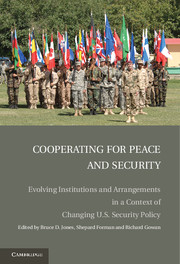 Cooperating for Peace and Security
Cooperating for Peace and Security Published online by Cambridge University Press: 22 January 2010
According to conventional wisdom, U.S. counterterrorism policy during the administration of George W. Bush was marked by a high degree of unilateralism. And indeed, the Bush administration's policy revealed a strong ideological predisposition against international rules and standing multilateral institutions, which was exacerbated by the terrorist attacks of 9/11. The “black book” of cases, in which the United States effectively circumvented, abrogated, unsigned from, downgraded, opposed, or undermined standing multilateral treaties and arrangements, is long: from the Conventional Test Ban Treaty to the Anti-Ballistic Missiles Treaty, from the Kyoto Protocol to the Rome Statute on the International Criminal Court, from the United Nations (UN) to the North Atlantic Treaty Organization (NATO). For many observers, the U.S. decision to go to war against Iraq in March 2003 in the absence of an explicit Security Council mandate served as evidence that Washington had nothing but contempt for international rules and norms and multilateral institutions.
Reviewing the Bush administration's approach to multilateral counterterrorism and the evolution of the international institutional architecture in the counterterrorism field during its tenure, this chapter paints a more nuanced picture.
The 2006 U.S. National Strategy for Countering Terrorism ambitiously but misleadingly states: “During the Cold War we created an array of domestic and international institutions and enduring partnerships to defeat the threat of communism. Today, we require similar transformational structures to carry forward the fight against terror.” Of course, 9/11 did not spark anything like a “Dean Acheson moment.
To save this book to your Kindle, first ensure no-reply@cambridge.org is added to your Approved Personal Document E-mail List under your Personal Document Settings on the Manage Your Content and Devices page of your Amazon account. Then enter the ‘name’ part of your Kindle email address below. Find out more about saving to your Kindle.
Note you can select to save to either the @free.kindle.com or @kindle.com variations. ‘@free.kindle.com’ emails are free but can only be saved to your device when it is connected to wi-fi. ‘@kindle.com’ emails can be delivered even when you are not connected to wi-fi, but note that service fees apply.
Find out more about the Kindle Personal Document Service.
To save content items to your account, please confirm that you agree to abide by our usage policies. If this is the first time you use this feature, you will be asked to authorise Cambridge Core to connect with your account. Find out more about saving content to Dropbox.
To save content items to your account, please confirm that you agree to abide by our usage policies. If this is the first time you use this feature, you will be asked to authorise Cambridge Core to connect with your account. Find out more about saving content to Google Drive.